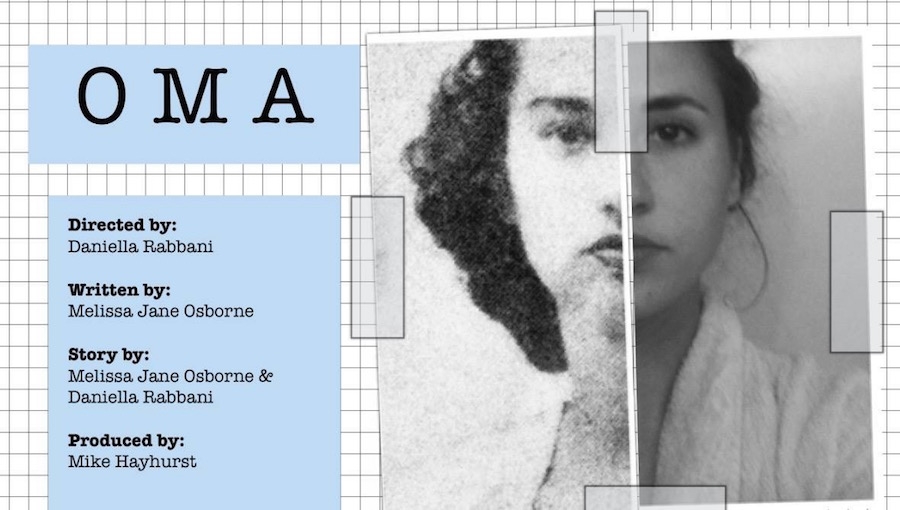The following is an interview with Daniella Rabbani, director and co-star of the film, OMA, which will soon be appearing as part of the 2017HollyShorts Film Festival. In this interview, Fanbase Press Contributor Russ Pirozek chats with Rabbani about the inspiration behind the film, the perspective that it offers on behalf of the survivors of the Holocaust, her creative process in working with the cast and crew, and more!
Russ Pirozek, Fanbase Press Contributor: Thank you for sharing this film with me and with audiences at the HollyShorts Film Festival. It was wonderful and very unexpected. As the film’s director and a member of the cast, what does this story mean to you?
Daniella Rabbani: I hope this story opens up conversation and curiosity about how our family history affects each of us.
RP: This subject matter of the film can is challenging but necessary to discuss. What perspective do you hope that the film offers to audiences about the events of the Holocaust and the brave survivors of this tragedy?
DR: I, like so many others, believed that my grandparents owed me the story of their life. That since they were Holocause survivors, and that history has impacted my life in so many ways, I deserved closure by way of details. It wasn’t until I tried to “get” my grandmother’s life story from her and was promptly dismissed that I realized how much I am missing out on NOW. Who is she today? What are the memories she’d like to pass on? The film was inspired by this experience and I hope audiences are inspired to approach their family history with a respectful curiosity, too.
RP: What can you share with us about your creative process of working with the cast and crew of the film?
DR: We shot the film in two and a half days on equipment granted to us by Panavion (the First Time Filmmaker Grant) at Ramapo Manor who kindly and generously invited us into their assisted living facility. The story resonated so deeply with folks that our locations, catering, and over $20k was donated to us. We’ve experienced so much love for our little film. Lynn Cohen, who is best known for her role as Magda in Sex in the City, stars in the film. I love her so much. I loved every nuanced change she made from take to take. I especially love the end where her makeup is genuinely smudged and she is understandably exhausted by a long day of indie filmmaking. She was so fun to play with, and she still calls me just to say she loves me. I’m still blown away by the whole experience!
RP: One of the most emphasized themes of the film seems to be the impact that the Holocaust had on future generations. Given the research you have posted about the effects of this on not only the children of survivors, but the grandchildren as well, what most connected with you regarding the potential pitfalls that they face – both by way of their upbringing and the way they view their family?
DR: I had always felt a sort of ache that wasn’t my own. I grew up in a loving and safe environment and yet there was a feeling of unrest. After some soul searching and research, I found that this is common amongst first and second generation holocaust survivors. In fact, it’s biological. This is true not just of Holocaust survivors’ families but of defendants of any great tragedy. It turns out, we are indeed a product of family genetics as well as family experience.
RP: For survivors, talking about living through this event may be very challenging. What do you feel that OMA is able to communicate to audiences on behalf of those who may be unable to share their story?
DR: From what I understand, different people processed the trauma of the Holocaust differently. Some, like Ellie Weisel, made it his life’s mission to share his experience for the betterment of all. Some never spoke of it until they passed. And many, like my grandparents, gave drips and drabs of information here and there. Laying them out for us to sew together. It is, of course, ideal for the family to have closure. To mourn together and move forward. But that’s not always possible.
I went to a training program to teach me how to speak to survivors to encourage them to document their history. In that training I raised my hand, frustrated, and told my teacher that my grandmother just wouldn’t talk. I rolled my eyes… I try but she won’t tell me. “How do I get her to tell me her story?” The teacher responded kindly and firmly, “You don’t. It’s her life. She has a right to tell and not tell whatever she wants.” I hope the film conveys this sentiment.
RP: For our readers who are interested in learning more about OMA, what is the best way to find information regarding the film?
DR: The OMA team send out emails regarding screenings, broadcasting, and more on https://www.seedandspark.com/fund/oma#updates. Alternatively, you can follow me on Twitter and instagram (@daniellarabbani).

